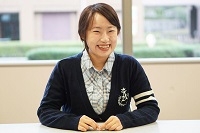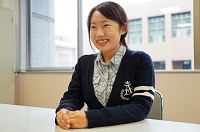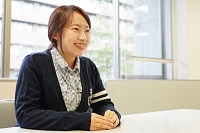
Qin Ling (China)
○2012.4~2013.3 Research Student
○2013.4~ Master's Program, Graduate School of Sciences, Hiroshima University
1. Why did you choose the major you are studying?
In China, I studied mathematics and informatics at university. I had an interest in Japan’s economic policies and social cultures, so I studied Japanese as my minor. After I graduated, I wanted to see more of the world outside of China. I left my home in Dalian and decided to study abroad somewhere close to home, in Hiroshima. The reason why I decided to study mathematics is to further deepen my knowledge.
2. Could you explain your research in detail?
The mathematics major in the Graduate School of Science, is divided into five research fields: Algebra, Geometry and Topology, Mathematical Analysis, Probability Theory and Mathematical Statistics, and Geometric and Algebraic Analysis. I am in Geometric and Algebraic Analysis, performing research using Concrete Mathematics by Graham, Knuth, and Patashnik. I have interest in the GCD formula of the Fibonacci numbers and I am researching the generalization of this sequence. The GCD of Fibonacci numbers was proven by Lucas as ${¥rmgcd}(f_{n},f_{m})=f_{{¥rm gcd}(n,m)}$
In my research paper, I first introduce the GCD formula of the Fibonacci sequence, which was my previous research, then generalize the Fibonacci numbers, and prove that the generalized Fibonacci number also follows the GCD formula.

3. When you came to Japan, what did you think about the courses that you attended?
When I first arrived at Hiroshima University, I studied here as a research student for a year. At that time, the majority of the classes I took were my mentor,Mr.Kimura's classes held at the undergraduate level. I needed to make presentations to the class a number of times. Once I started my master's course, other than my required classes, I decided to take Japanese classes for international students at the Foreign Language Center to improve my Japanese ability. There were also some English classes that used movies as a way of studying and they were very fun. Without much effort, my English ability was also improving.
Mr. Kimura is a very kind teacher. He respects each student’s unique interests and abilities, and guides you through finding your research theme and helps point you in the right direction. He would never make a student do anything against their will. He is a passionate and determined mentor. Even when communication is sometimes difficult because I am an international student, he is always patient and thorough with me.
4. What is the atmosphere like in your faculty study room?
Compared to other research offices, there are not many girls. Luckily, I have a senpai (same faculty student a year ahead) that is a Japanese girl. She was my tutor when I first arrived in Hiroshima. She has helped me get used to the life style and studies here. We still contact each other frequently and go out to eat together.

5. Please allow me to ask a question about your future goals. What kind of work would you like to do?
First and foremost I want to officially graduate. It has been almost three years since I have arrived in Japan. For my job, I would like to work using Japanese, for example, either working for a Japanese company, or becoming a Japanese teacher. I believe what I am studying today has great meaning. I have acquired strong logical thinking skills through mathematics and this will be of great use in any career.
By working for a Japanese company or in a job requiring Japanese, even if it is something small, I want to work towards a happy relationship between Japan and China. I would like to pass on the wonderful things about Japan that I have seen with my own eyes to my friends in China.


 Home
Home





